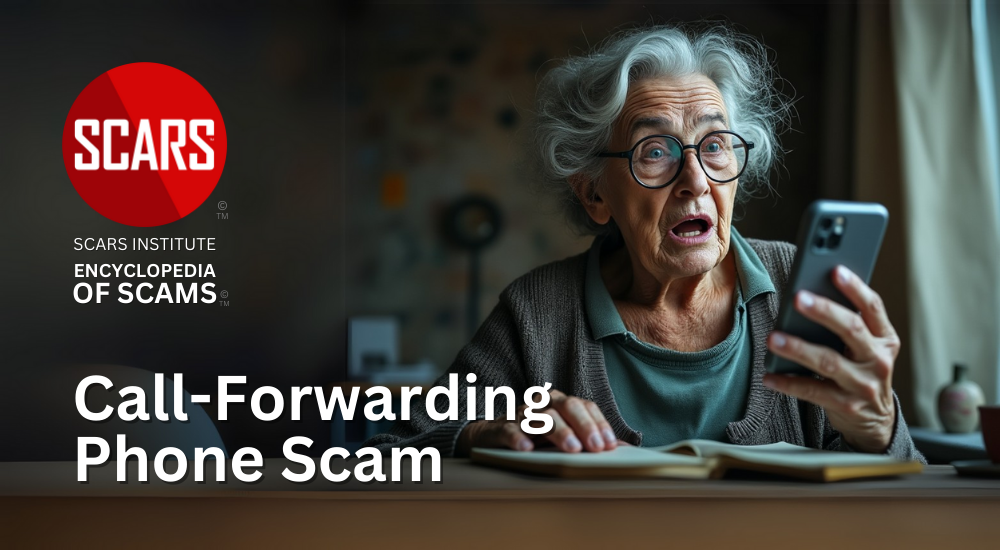
SCARS Institute’s Encyclopedia of Scams™ Published Continuously for 25 Years

Call Forwarding Scam – SCAM WARNING
BEWARE the Call Forwarding Scam: How Scammers Exploit Phone Features for Fraud
How Scams Work – A SCARS Institute Insight
Author:
• SCARS Institute Encyclopedia of Scams Editorial Team – Society of Citizens Against Relationship Scams Inc.
Article Abstract
The “Call Forwarding Scam” is a sophisticated fraud tactic that exploits the phone feature *72 to redirect victims’ calls to scammers, enabling them to intercept sensitive communications. Often initiated with a late-night call and a fabricated emergency, the scam manipulates victims into activating call forwarding, allowing scammers to hijack multi-factor authentication calls and access accounts such as banking, social media, and email.
This facilitates identity theft, financial fraud, and further exploitation of the victim’s contacts. To protect against this scam, individuals should understand call forwarding, independently verify emergencies, strengthen account security, and spread awareness. If victimized, immediate steps like deactivating call forwarding (*73), notifying the phone carrier, and securing accounts can mitigate damage. Vigilance and proactive security measures are key to defending against this growing threat.

WARNING – Beware the Call Forwarding Scam: How Scammers Exploit Phone Features for Fraud
A new phone scam has emerged called the “Call Forwarding Scam,” and it is gaining traction in the U.S., preying on unsuspecting individuals by exploiting a phone feature designed for convenience. This tactic not only tricks victims into redirecting their calls but also grants scammers a pathway to steal sensitive information, commit fraud, or impersonate victims.

How the Call Forwarding Scam Works
The scam operates with precision and psychological manipulation:
- Late-Night Call Tactic
Scammers often call their victims during late hours to catch them off guard, heightening their emotional vulnerability and impairing their judgment. - Emergency Scenario
The scammer fabricates an urgent situation, such as a family member in a hospital or a legal crisis, to pressure the victim into immediate action. - Instructions to Dial *72
Victims are directed to dial a phone number beginning with *72, followed by a 10-digit number, under the guise of connecting with someone who can assist. - Call Forwarding Activation
Dialing *72 unknowingly activates the phone’s call-forwarding feature, redirecting all incoming calls to the scammer’s number.
Once the scammer gains control of the victim’s calls, they can intercept sensitive communications and use the hijacked number for further exploitation.
An Alarming Goal: Account Takeovers
One significant purpose behind this scam is account takeover. Many accounts—social media, financial platforms, email services, and more—use multi-factor authentication (MFA) for added security. Often, one MFA option involves receiving an authentication or authorization code via phone call.
When a scammer hijacks a victim’s phone through call forwarding, they can intercept these verification calls. This allows them to:
- Reset Passwords: By accessing authentication codes sent via call, scammers can reset account passwords, effectively locking the victim out.
- Gain Access to Financial Accounts: With control over codes sent for banking apps or payment platforms, scammers can transfer funds, make fraudulent purchases, or steal financial data.
- Compromise Social Media: Taking over social media accounts enables scammers to impersonate victims, conduct further scams, or damage reputations.
- Wider Fraud Opportunities: Control over a victim’s phone number facilitates new scams targeting others within the victim’s contact network.
The Risks of the Call Forwarding Scam
- Identity Theft: By intercepting communications, scammers can impersonate victims to steal personal information.
- Financial Fraud: Scammers gain access to banking and payment accounts, potentially causing severe financial losses.
- Missed Critical Communications: Victims may miss essential calls, such as medical alerts or job-related communications.
- Further Exploitation: Using the victim’s number, scammers can launch additional fraud schemes against the victim’s contacts.
Protecting Yourself from the Call Forwarding Scam
To defend against this scam and its devastating consequences, take these steps:
- Understand Call Forwarding Features
Learn how call forwarding (*72) works and its deactivation code (*73) to maintain control over your phone. - Verify Emergencies Independently
If contacted about an emergency, hang up and verify the situation through reliable, trusted sources. - Be Wary of Urgency
Scammers exploit urgency to bypass critical thinking. Pause, evaluate, and consult someone you trust before taking action. - Monitor Your Accounts
Regularly review your bank, social media, and other accounts for unusual activity. Ensure contact information is correct. - Strengthen Security Practices
-
- Enable multi-factor authentication on all accounts, but prefer app-based or hardware token options rather than phone call-based MFA.
- Use strong, unique passwords and a password manager to secure accounts.
- Spread Awareness
Inform friends, family, and colleagues about this scam to help them avoid falling victim.
What to Do If You’ve Been Scammed
If you’ve dialed *72 and suspect a scam:
- Deactivate Call Forwarding: Dial *73 immediately to stop call forwarding.
- Notify Your Phone Carrier: Report the incident and ensure your accounts are secure by changing the passwords – use secure three-word phrases.
- Secure Your Accounts: Change passwords and update authentication settings for all critical accounts.
- Monitor for Fraud: Watch for suspicious activity across financial and personal platforms.
- Report the Scam: Notify the Federal Communications Commission (FCC) or the Federal Trade Commission (FTC). If you have had any financial loss, report it to your local police and the FBI – go to reporting.AgainstScams.org to learn how.
Final Thoughts
The Call Forwarding Scam represents a dangerous evolution in fraud tactics, exploiting phone features to compromise accounts and cause financial and emotional harm. By understanding how it works and taking proactive measures, individuals can protect themselves and their information. Awareness and vigilance remain the best defenses against these sophisticated scams. Always question unsolicited calls, especially those urging immediate action, and prioritize verifying any claims independently.
-/ 30 /-
What do you think about this?
Please share your thoughts in a comment below!
Table of Contents
LEAVE A COMMENT?
Recent Comments
On Other Articles
- velma faile on Finally Tax Relief for American Scam Victims is on the Horizon – 2026: “I just did my taxes for 2025 my tax account said so far for romances scam we cd not take…” Feb 25, 19:50
- on Reporting Scams & Interacting With The Police – A Scam Victim’s Checklist [VIDEO]: “Yes, this is a scam. For your own sanity, just block them completely.” Feb 25, 15:37
- on Danielle Delaunay/Danielle Genevieve – Stolen Identity/Stolen Photos – Impersonation Victim UPDATED 2024: “She goes by the name of Sanrda John now” Feb 25, 10:26
- on Reporting Scams & Interacting With The Police – A Scam Victim’s Checklist [VIDEO]: “So far I have not been scam out of any money because I was aware not to give the money…” Feb 25, 07:46
- on Love Bombing And How Romance Scam Victims Are Forced To Feel: “I was love bombed to the point that I would do just about anything for the scammer(s). I was told…” Feb 11, 14:24
- on Dani Daniels (Kira Lee Orsag): Another Scammer’s Favorite: “You provide a valuable service! I wish more people knew about it!” Feb 10, 15:05
- on Danielle Delaunay/Danielle Genevieve – Stolen Identity/Stolen Photos – Impersonation Victim UPDATED 2024: “We highly recommend that you simply turn away form the scam and scammers, and focus on the development of a…” Feb 4, 19:47
- on The Art Of Deception: The Fundamental Principals Of Successful Deceptions – 2024: “I experienced many of the deceptive tactics that romance scammers use. I was told various stories of hardship and why…” Feb 4, 15:27
- on Danielle Delaunay/Danielle Genevieve – Stolen Identity/Stolen Photos – Impersonation Victim UPDATED 2024: “Yes, I’m in that exact situation also. “Danielle” has seriously scammed me for 3 years now. “She” (he) doesn’t know…” Feb 4, 14:58
- on An Essay on Justice and Money Recovery – 2026: “you are so right I accidentally clicked on online justice I signed an agreement for 12k upfront but cd only…” Feb 3, 08:16
ARTICLE META
Important Information for New Scam Victims
- Please visit www.ScamVictimsSupport.org – a SCARS Website for New Scam Victims & Sextortion Victims
- Enroll in FREE SCARS Scam Survivor’s School now at www.SCARSeducation.org
- Please visit www.ScamPsychology.org – to more fully understand the psychological concepts involved in scams and scam victim recovery
If you are looking for local trauma counselors please visit counseling.AgainstScams.org or join SCARS for our counseling/therapy benefit: membership.AgainstScams.org
If you need to speak with someone now, you can dial 988 or find phone numbers for crisis hotlines all around the world here: www.opencounseling.com/suicide-hotlines
A Note About Labeling!
We often use the term ‘scam victim’ in our articles, but this is a convenience to help those searching for information in search engines like Google. It is just a convenience and has no deeper meaning. If you have come through such an experience, YOU are a Survivor! It was not your fault. You are not alone! Axios!
A Question of Trust
At the SCARS Institute, we invite you to do your own research on the topics we speak about and publish, Our team investigates the subject being discussed, especially when it comes to understanding the scam victims-survivors experience. You can do Google searches but in many cases, you will have to wade through scientific papers and studies. However, remember that biases and perspectives matter and influence the outcome. Regardless, we encourage you to explore these topics as thoroughly as you can for your own awareness.
Statement About Victim Blaming
SCARS Institute articles examine different aspects of the scam victim experience, as well as those who may have been secondary victims. This work focuses on understanding victimization through the science of victimology, including common psychological and behavioral responses. The purpose is to help victims and survivors understand why these crimes occurred, reduce shame and self-blame, strengthen recovery programs and victim opportunities, and lower the risk of future victimization.
At times, these discussions may sound uncomfortable, overwhelming, or may be mistaken for blame. They are not. Scam victims are never blamed. Our goal is to explain the mechanisms of deception and the human responses that scammers exploit, and the processes that occur after the scam ends, so victims can better understand what happened to them and why it felt convincing at the time, and what the path looks like going forward.
Articles that address the psychology, neurology, physiology, and other characteristics of scams and the victim experience recognize that all people share cognitive and emotional traits that can be manipulated under the right conditions. These characteristics are not flaws. They are normal human functions that criminals deliberately exploit. Victims typically have little awareness of these mechanisms while a scam is unfolding and a very limited ability to control them. Awareness often comes only after the harm has occurred.
By explaining these processes, these articles help victims make sense of their experiences, understand common post-scam reactions, and identify ways to protect themselves moving forward. This knowledge supports recovery by replacing confusion and self-blame with clarity, context, and self-compassion.
Additional educational material on these topics is available at ScamPsychology.org – ScamsNOW.com and other SCARS Institute websites.
Psychology Disclaimer:
All articles about psychology and the human brain on this website are for information & education only
The information provided in this article is intended for educational and self-help purposes only and should not be construed as a substitute for professional therapy or counseling.
While any self-help techniques outlined herein may be beneficial for scam victims seeking to recover from their experience and move towards recovery, it is important to consult with a qualified mental health professional before initiating any course of action. Each individual’s experience and needs are unique, and what works for one person may not be suitable for another.
Additionally, any approach may not be appropriate for individuals with certain pre-existing mental health conditions or trauma histories. It is advisable to seek guidance from a licensed therapist or counselor who can provide personalized support, guidance, and treatment tailored to your specific needs.
If you are experiencing significant distress or emotional difficulties related to a scam or other traumatic event, please consult your doctor or mental health provider for appropriate care and support.
Also read our SCARS Institute Statement about Professional Care for Scam Victims – click here to go to our ScamsNOW.com website.
















Thank you for your comment. You may receive an email to follow up. We never share your data with marketers.